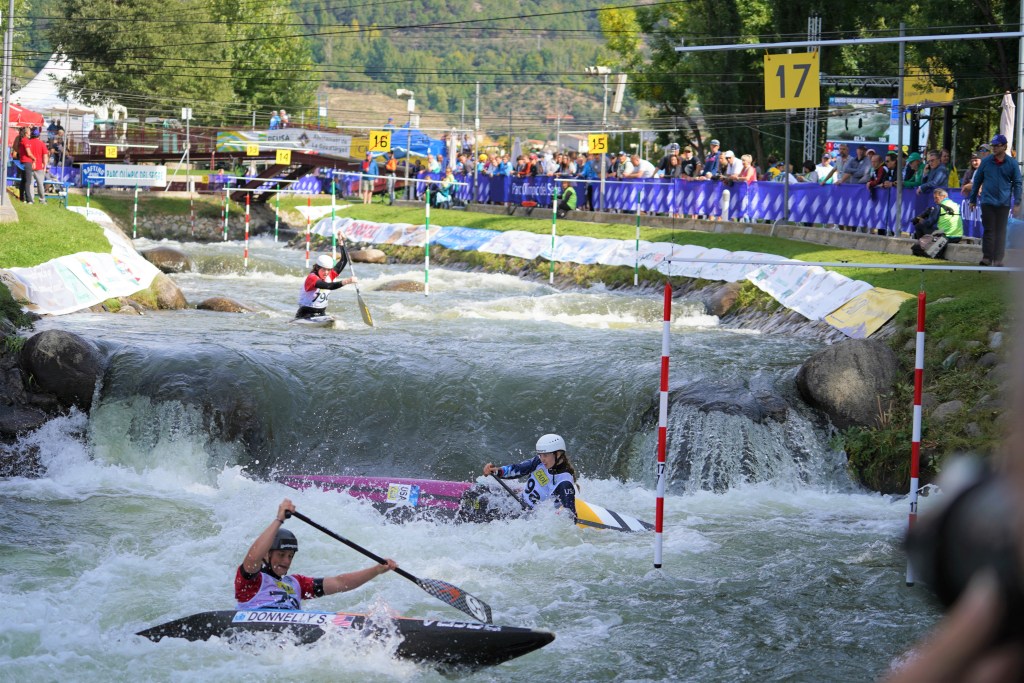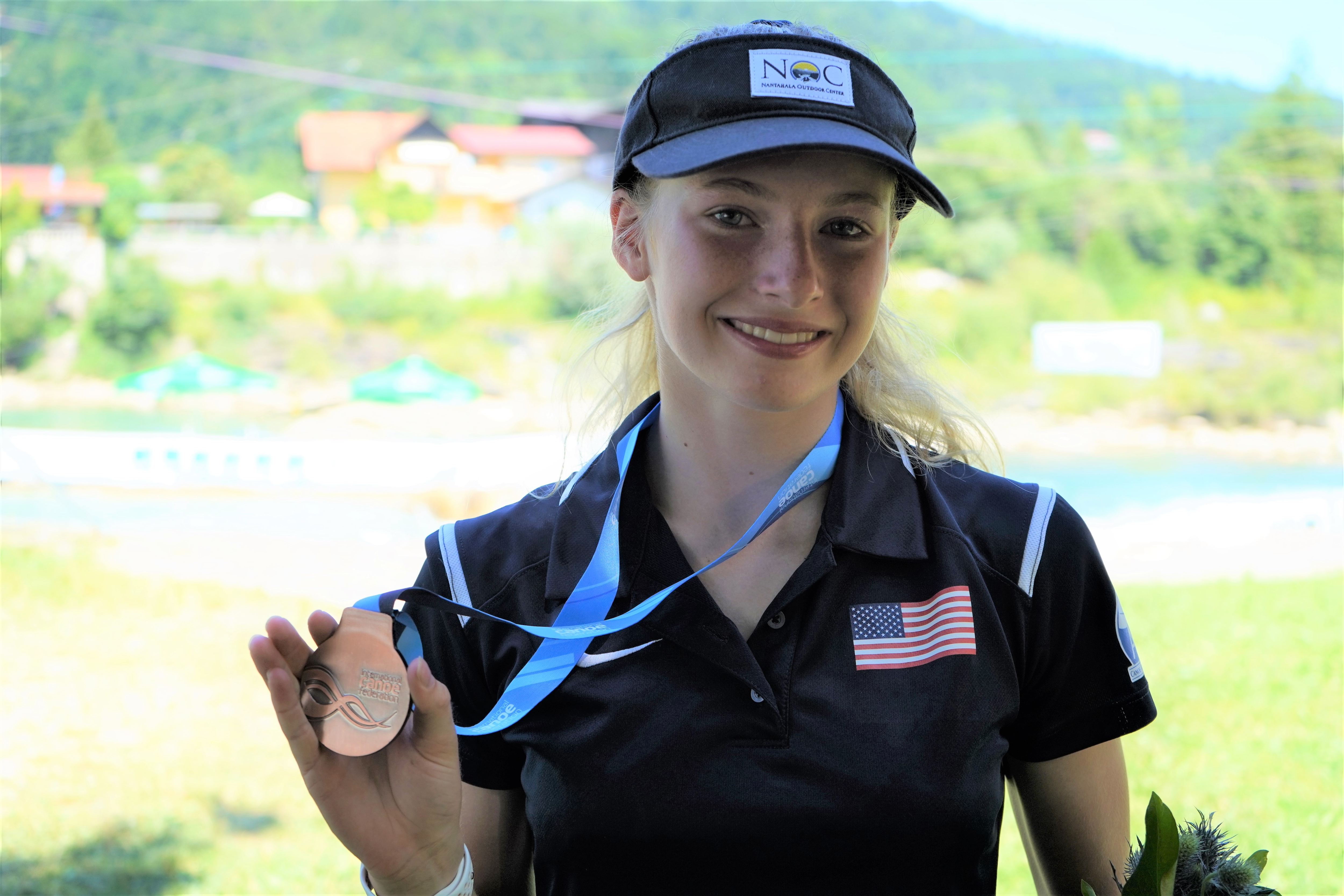Evy Leibfarth still remembers her first kayak. She was 4, the boat was bright pink and she loved it. Now, 15-year-old Leibfarth is in a different craft—one built for competitive slalom racing that she’s used to burst onto the international kayaking scene.
In 2018, still too young to enter professional competitions, she’d already qualified for the U.S. women’s national team. So it came as no surprise when Leibfarth, finally eligible to compete, began dominating the field this year, making the finals during her world cup debut in Slovakia and podiuming at the Junior World Championship in extreme slalom in July. She chased these victories with a fourth-place finish in the ICF Slalom Canoe World Championships and took gold at the Pan American Games in Peru. In a single season, Leibfarth has established herself as one of the best paddlers in the world.
“Right now my focus is just on getting better,” she says. Despite an abundance of recent success, Leibfarth is laser-focused on bolstering her whitewater skills. That’s something it seems like she was born to do. Her mom, Jean Folger, worked as a whitewater rafting guide on the Chattooga River from 1991 to 1998, and was guiding on the Nantahala River while pregnant with Leibfarth in 2003. Her dad, Lee Leibfarth, is a former competitive racer who coached the U.S. junior national team between 1998 and 2002. Leibfarth was raised running the Nantahala and the river still serves as her training ground when she’s home in Bryson City, North Carolina. These days, though, she’s on the road more often than not.
“I think I’ve been home one month this entire year,” Leibfarth says, ticking off the countries she’s visited most recently—Peru, Italy, Prague, Spain, Slovenia, Australia. She seems energized by the travel and talks animatedly about her recent trip to Tokyo to test a new human-made course for the 2020 Summer Games. “I had never been to Asia and I love all these new experiences,” she said.
No longer a river guide, Folger works as a freelance writer covering real estate while Lee serves as Leibfarth’s coach. The family travels together and Leibfarth attends the K12 International Academy, which lets her enroll in online seminars and video conference with her teachers. Folger works from the road. “As long as we have a good internet connection, it’s business as usual,” Lee says.
At home in Bryson City, Leibfarth’s day starts at 7am with breakfast followed by a workout on Fontana Lake, a 15-minute trip from home. By 10am, Leibfarth has settled into her desk where she hits the books until 3:30pm, when the father-daughter duo heads back out to a slalom course on the Nantahala for practice part two. In addition to paddling, Leibfarth ticks off a few weight-training sessions and an occasional mountain bike ride each week. Though the schedule sounds intense, the family says it works.
“It’s all about giving Evy her own space. We made a point never to push her into the sport when she was younger,” Lee says. “There’s serious training that has to be done, but we do our best to make it fun—and we let Evy dictate how much we travel and how much she competes.”

Leibfarth’s recent world cup wins earned her qualifying spots in both the women’s canoe slalom and kayak slalom competitions for the 2020 Summer Games. (Photo Credit: Jean Folger)
Leibfarth says she can’t imagine things any other way. She loves having her father as her coach, being on the river and working to get faster. She even seems to relish watching—and rewatching—video of her training sessions to find tiny improvements to give her an edge over the competition.
“Kayaking isn’t all about strength and power, it’s about learning how to be smooth on the water,” she says. “When I race, I really like the adrenaline. When you’re in the start gate, you have all this energy—I think it’s fun to push yourself to go faster.”
Though kayaking is her primary focus, the athlete does have other interests. She loves to surf, is a star student (she’ll likely graduate a year ahead of most other kids her age) and has a passion for fine art. The morning before a big race, she’ll often sit down and sketch waves to help her find her calm and focus.
For college, she’s thinking about majoring in graphic design or perhaps pursuing pre-med. She’ll continue to paddle regardless of her major. “Everybody kayaks where she grew up, and being able to pursue this sport with her friends made it fun,” Lee says. “Ultimately, she’s very self-motivated and goal-driven. That’s just how she’s wired.”
When asked about burnout, Lee says he doesn’t foresee his daughter tiring of paddling anytime soon. “She loves everything about being a canoe slalom athlete—from the daily training grind to the travel and the competitions,” he says. “Not once has she wanted to skip a workout or miss a race—even if it’s raining or snowing. She’s always the first one on the water and the last one off—and always with a smile.”
Leibfarth will need to summon all of that passion in order to qualify for the fast-approaching Summer Games, which will carry a maximum of two women kayakers—one in canoe slalom and one in kayak slalom—to Tokyo 2020. Her world cup wins this summer earned her the U.S. qualifying spots in both canoe and kayak, meaning she could end up the country’s only woman kayaker competing in both events.
But first Leibfarth needs to do well in the U.S. national team trials, which consist of two separate races at the Riversport Rapids Whitewater Course in Oklahoma City the first two weekends in May. If she places first or second in one of those races, she’ll qualify for the Summer Games. She’ll train for five weeks in Australia over the winter to prepare for the events.
“I feel good,” Leibfarth says, adding that she likes the whitewater course in Tokyo, which resembles the courses she trains on in the U.S. “Doing well at the world cup events last summer definitely helps my chances leading into the team trial races, but anything can happen in whitewater. All I can do is focus on getting better.”
